Congressional Compromise? $908 Billion for COVID Relief in Two Bills

U.S. Speaker of the House Nancy Pelosi has endorsed a coronavirus aid package presented by a bipartisan group of legislators in the amount of $908 billion, dropping her demands for a minimum of $2.2 trillion in spending.
As things stand now, the initial $908 billion package has been split into two bills – provisions for both $160 billion in direct aid to state, local, and tribal governments and an employer-liability shield have been turned into a stand-alone bill. The larger portion, $748 billion, covers all other immediately proposed aid.
Absent in the proposed aid package is a second round of $1,200 direct stimulus checks to taxpayers, though breaking news indicates the Congressional leadership is discussing whether to add such direct payments, either of $1,200 per individual and $500 per child or in lesser amounts.
However, there is significant good news here for Paycheck Protection Program (PPP) loan recipients, in that the proposal (in its present form) will codify as law that eligible forgivable costs paid with the proceeds of PPP loans will be tax-deductible, contrary to the IRS’ current position in Revenue Ruling 2020-27 that such expenses are not tax-deductible.
What the larger bill proposes, per details released December 14, 2020:
Paycheck Protection Program & Small Business
- $300 billion to the SBA.
- This funding will provide for PPP Second Draw loans for hard-hit small businesses with 300 or fewer employees that have sustained a 30% drop in revenue in any quarter of 2020.
- Newly qualifying for PPP loans are 501(c)(6) organizations that do not lobby and have 150 or fewer employees; e.g., chambers of commerce, economic development organizations, and tourism offices would become eligible for PPP loans.
- Eligible forgivable expenses will expand to include supplier costs, as well as modifications to facilities and personal protective equipment to ensure safe operations.
- Business expenses paid with PPP loan proceeds are to be tax-deductible, which is contrary to the current IRS position but is consistent with the intentions of Congress in its passage of the CARES Act, Section 1006.
- The PPP loan forgiveness process will be further simplified for borrowers with loans of $150,000 or less.
- Inclusion of set-asides for smaller borrowers and underserved communities.
- Additional funding for independent live venue operators impacted by states with “stay-at-home” orders.
- Extension of Section 1112 of the CARES Act, which provides payment of principal, interest, and attendant fees on qualifying SBA 7(a), 504, and microloans.
- Funding to increase guarantees and provide subsidies for SBA 7(a) loans, to reduce fees on 7(a) and 504 loans, and to provide economic Injury Disaster Loan grant advances.
Community Development Financial Institution (CDFI) / Minority Depository Institution (MDI) Community Lenders
- $12 billion in targeted emergency investments for low-income and minority communities, including $2 billion for emergency relief and $10 billion for emergency capital injections.
Unemployment Assistance
- Extension of all pandemic insurance programs, together with supplemental Federal unemployment benefits of $300 per week for 16 weeks (from December 31, 2020, which is the current end date, into April of 2021).
- $1 billion to states to modernize technology and implement fraud prevention measures.
Other Provisions
- $82 billion for education providers, including private schools.
- $35 billion to the health care Provider Relief Funds, including $7 billion to rural providers and $1 billion for indigenous tribes, tribal and urban Indian health organizations, and health service providers for tribes.
- $25 billion for rental assistance to state and local governments and indigenous tribes.
- Forbearance on student loan payments is extended from its current cutoff of January 31, 2021, though April 30, 2021.
- Increased support for nutrition programs including SNAP, EBT, WIC, and more.
- $13 billion for assistance to agricultural businesses and fisheries.
- $10 billion for testing and tracing, including $7 billion in direct grants to states, territories and tribes, and $2 billion for nursing homes and other long-term care, HCBS and assisted living facilities.
- $10 billion upon request to the USPS with no repayment required.
- $10 billion to struggling child-care providers.
- $10 billion to expand broadband access.
- $6 billion for vaccine development and distribution.
- Approximately $4.6 billion for addiction and mental health aid.
It remains to be seen whether either or both bills in the coronavirus aid package will pass both House and Senate. Some legislators have expressed dismay over the lack of stimulus checks to individuals; others are leery of the U.S. borrowing additional funds on top of the debt we have already incurred in providing COVID-19 relief.
However, bipartisan negotiations continue, with the proposal as a starting point and the hope of finalizing a relief bill this week. Many lawmakers are insisting relief cannot wait any longer.
If you have questions on the latest stimulus package and how it might – depending on the final bill’s provisions – impact you, your family, or your business, please click here to email me directly.
Until next Wednesday –
Peace,
Eric
